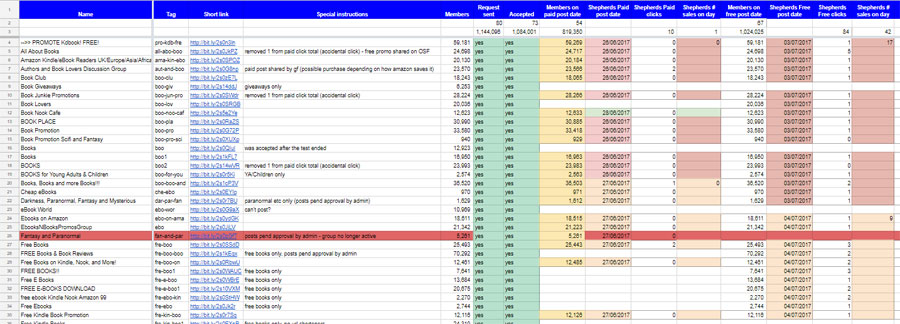Adventures in marketing: Are Facebook groups worth it?
When it comes to marketing your book, there's a lot of different advice out there and it can be hard to separate the wheat from the chaff. Unless you're a full-time author, there's only so many hours in the day to balance writing, editing, publishing, and marketing. It helps to know if what you're doing has tangible results that make it worth your time.
In terms of marketing, everything you do is going to be broken down into two categories:
- Paid, for those with money but no time - ideal for seeing results fast
- Free, for those with time but no money - ideal if you don't mind doing the grunt work
A free tactic often touted is to post your book into as many Facebook groups as you can - free advertising right?
Being somewhat skeptical, I wanted a definite answer - nothing but cold, hard numbers.
What we're trying to answer
Before doing something like this, you need to be crystal clear on what you're trying to get out of it, and make sure you're only testing that. For this one, it's simple:
Is posting my book to Facebook groups worth my time, both for free and paid?
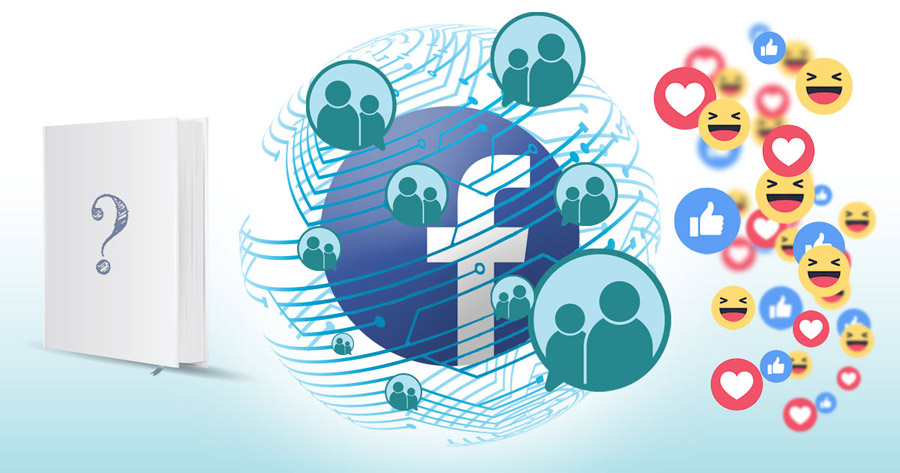
The setup
First up, choose the book that's going to act as your guinea pig. I'm using my book Shepherds: Awakening for this. Sales have died down enough to the point where I can directly say doing X resulted in Y copies. This is important because, as Amazon doesn't provide any analytics where you can attribute clicks, you want to eliminate as much guesswork as possible.
Everything I'm about to describe is laid out in a pretty detailed spreadsheet that you can check out to see the nitty gritty. There'll also be support files at the end of the post.
Before doing this, you first have to join as many Facebook groups as you want. Give yourself some time to do this, as while some groups are open, others can take a long time to accept your request, if ever.
In order to test both free and paid, you'll also need to be in KDP with enough free promo days left over. How many free days you want to give up will depend on how many groups you're comfortable with posting in. It's a balance between getting a good enough spread vs being able to say which groups are more effective than others. If you post to all your groups in the same day, while you'll know the number of clicks, you won't know which one is responible for the buyers.
If you want to test this out yourself, then make a copy of the spritesheet and fill in your data.
Final point: give a quick heads-up to whoever you think might be share one of your posts, to not do that. Some of your friends and family might see what you're doing and want to help you along. While it's genuinely great, it can also mess with your results (are the clicks attributed to group X coming from that group, or because the same link was shared by your family?).
How the test is going to work
In each group, you're going to post the exact same image and sales pitch, like below:
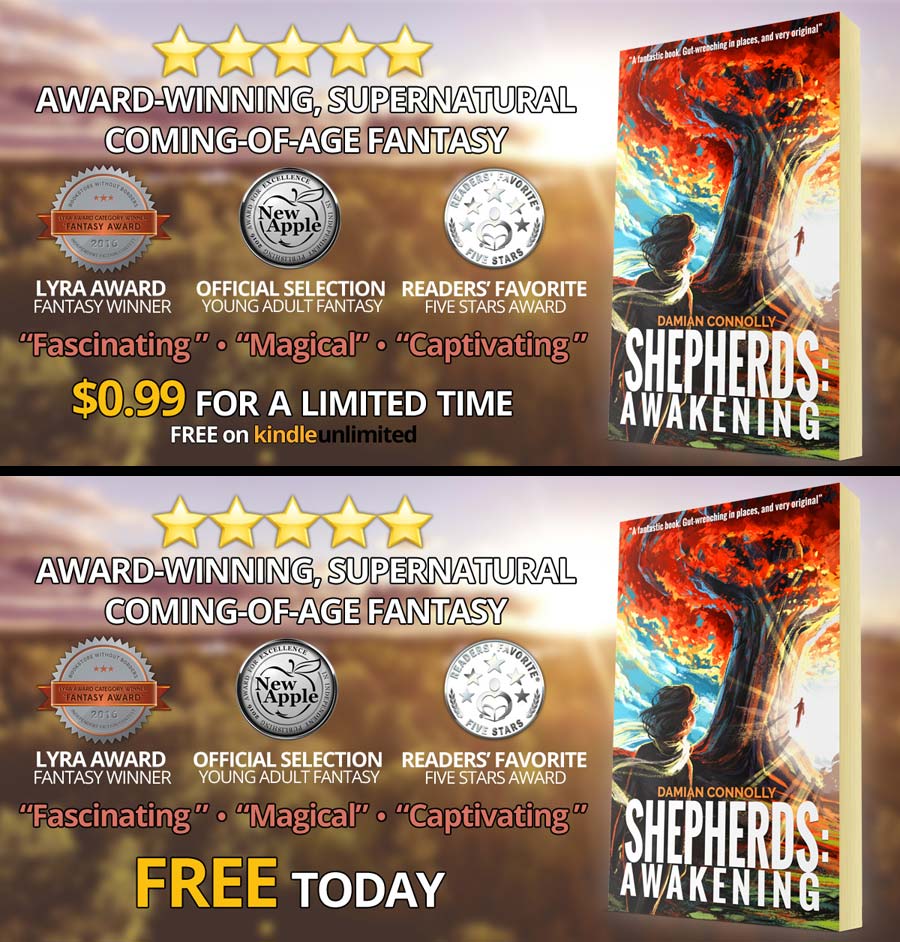
The top pic was posted when testing paid promos, while the bottom pic was for the free days. Only the pricing info changed. To try and persuade the most people possible, the image was designed to be colourful, show off the rating, the type of book it is, the awards it's won, and some snippets from reviews.
For the blurb, I used the following text:
FREE today! - %URL%
== A multi-award winning novel, Awakening is a supernatural coming-of-age fantasy for readers who liked Philip Pullman's His Dark Materials, or Neil Gaiman. ==
Aisling has always lived in her head, wishing for something more. Something *better*. But when she finds herself fleeing for her life in a world where reality seems flexible, it isn't exactly what she had in mind.
When her absentee father shows up there, she soon starts questioning her very sanity. But he explains it all. Who they are, where they are, and what the deal is with all the dead people.
And what's trying to *eat* them.
She has a name to live up to. If she accepts, it'll break her, and she'll have to sacrifice everything. In the end, there needs to be a Shepherd.
All she has to do is open a door...
==> %URL% <==Again, the sales pitch should tell you exactly what the book is about, and assuage any doubts as to whether it's a good book ("A multi-award winning..."). For the paid promo, the "FREE today!" was replaced with "$0.99/FREE on Kindle Unlimited!"
So what are the %URL% parts?
This is where URL-shortening services, like bit.ly come in. You take your universal book link (I'm using BookLinker) and append a unique param to the end of it. It can be whatever you want, you just need to be able to identify the Facebook group it belongs to.
I used a truncated form of the group name, so the URL
http://getbook.at/shepherdsbecame
http://getbook.at/shepherds?ref=all-abo-boofor the Facebook group All About Books.
Bit.ly keeps stats on each click, as well as the country and referrer (in this case, the referrer will be entirely Facebook). You can probably get more detailed stats if you unlock the Enterprise edition of bit.ly, but the free version is good enough for our needs.
So each group gets its own unique link, which is replaced in the %URL% parts above.
Um, that seems like a lot of work.
Don't worry, I've tools to automate all of this at the end of the post. Once you're set up, the actual posting only takes a few minutes.
Then you just post to your groups at the same time each day. Technically you can post at different times in order to catch all the different timezones, but a lot of groups have rules like only being allowed to post once a day. I chose 9pm as I'm based in France. It gets all the evening folk in Europe, while it's midday in the States. Posting at the same time each day gives more consistent results and eliminates bias due to the time of the post.
Once your posts are done, you just need to count up the clicks in bit.ly and the sales in KDP.
A word on Facebook groups
You can join as many groups as you want for this. I personally wanted a good coverage, so I kept joining groups until I had a potential exposure with 1m users.
At the time of writing, I requested to join 80 groups and got accepted to 73 of them. 2 came after the test, so they didn't count.
Even though there was a potential of over 1m sets of eyeballs, some people are obviously in more than one group, so after some playing around with the Facebook Graph API, I pulled the details (excuse the hideous chart).
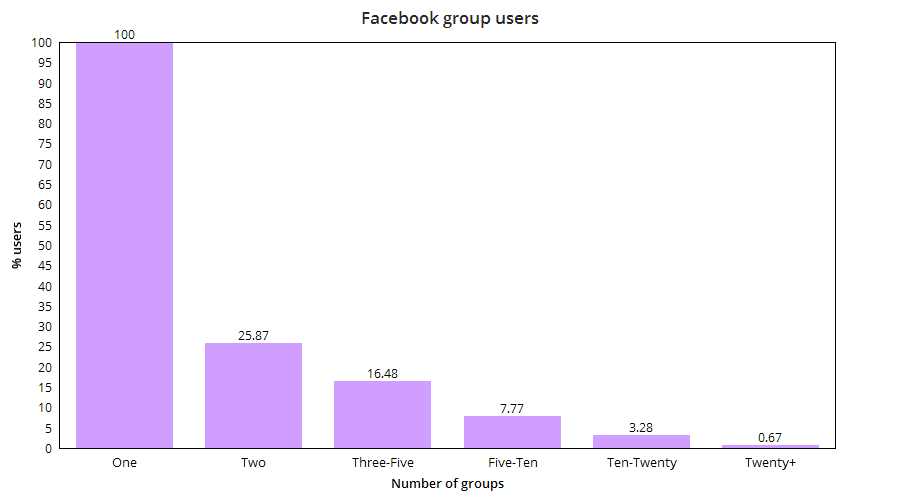
- While the graph doesn't show the exact numbers, of the over 1m combined users, only ~485k are unique, or about 46%
- Of those 485k, over 25% are in two groups
- Over 15% are in up to five groups
How you take this is debateable. On the one hand, your potential pool is diminished, while on the other, it's possible they'll see your post more than once and be more likely to click.
Another thing you need to take into account is some of the members are authors themselves, there to post their own book, and who don't necessarily care about yours.
In any case, in order to reach the most people possible, we need to diversify (dur).
Running the test
I ran the paid promo first. The only reason I did this was under the assumption of the same person seeing both, I ideally wanted them to buy the book rather than get it for free (Papa needs to get paid).
Some of the groups won't be valid depending on what you're posting. For example, there's no point posting the paid promo in free-only groups. That's just a quick way to get your post deleted and banned from the group.
For the paid promo, I posted in 54 groups for a potential coverage of ~820k users. For the free promo, it was 67 groups for a potential coverage of 1m+ users.
Some groups use the Facebook feature for selling items, which is annoying, as you have to type more, while others have admins approve posts, so not everything you post is going to make it.
Also, when posting, make sure to attach the image first, rather than paste the sales text. Otherwise, Facebook will see the URL in the text, and try to load a preview of your book on Amazon rather than use your image.
If you're using the tools that come at the bottom of the page, you can simply click on the Copy button to copy the right sales pitch and open the right group.
In order to keep the results as clean as possible, the free and paid promos should ideally be posted on the same days, to eliminate any bias. In my case, I was doing on average around 20 posts a day, for 4 days, from Monday to Thursday.
There have been stories of some users being banned for posting in too many groups at once. Personally, it didn't happen to me - perhaps because the URL was different so it didn't count as spam - but it's something to keep in mind.
The results
If you've gotten this far, congratulations! I probably could have put a TL;DR at the start of the post, but then all this lovely writing would have gone to waste.
Drum roll...
For the paid promo, I had...
10 clicks, and 1 sale (woo).
Lift that jaw back up off the floor.
For the free promo, I had...
84 clicks, and 42 sales.
Somewhat better but still pretty pathetic.
I'm not actually that surprised. Posting to Facebook groups has always had a bit of a whiff of "post your links as comments in as many blogs as you can find for easy SEO" from back in the good ole days of the web.
Well that's just disappointing, Damian.
Yes, and no. For me, for this book, it's next to worthless - well 42 copies is 42 copies, but if I posted this to my personal Page, or spent €5 on Facebook ads, I'd probably beat that. I might run this experiment again for my next release, which is a novella in a different genre, to answer the question of if it's just because of the genre, but for the minute, doing this as a regular marketing exercise isn't worth my time.
You might get much more use out of it, and if it's something that sounds interesting, stick around and I'll show off my tools for making stuff like this a breeze. It would be nice to have a broad range of data to work with.
NOTE: As an aside; if you've ever bought any "promotion" service from Fiver or the like, which promise they'll expose your book to however many users, this is essentially what you're buying. The More You Know ™
Also there are some big caveats to keep in mind (see below).
So what can we tease out from this?
No experiment is a complete failure, as we always come out with more info than we went in - in this case I now know rather than guess my time would be better spent elsewhere.
But what else can we figure out?
Well for one thing, the ratio for number of users to post interaction is pretty damn low (again, see the caveats section). However, there doesn't seem to be a relation between the number of users in a group. As in, your post seems to have the same interaction irregardless of the number of people in the group. Though again, the results are so small it's hard to say definitively. You might have better luck posting in smaller groups with only a few hundred members rather than massive groups with thousands, where the post can quickly get buried.
On the free day, I had 84 clicks, but only 42 downloads. This tells me:
- There's something wrong on my Amazon page, such as a bad description, OR
- They were expecting something other than Amazon (e.g. Kobo)
The fact it's Amazon-only isn't specified in either the image or sales pitch (my bad), so it's hard to say which. As a free book, there should be no barrier to entry for actually downloading it. If they've clicked on it, that's a sign of interest. Not downloading it afterwards means something has stopped them - the book description might not have sold them, for example. It's something to work on.
The vast majority of my clicks came from the US, which isn't terribly surprising, but it hints at a strong US showing in Facebook groups, or the post time (around midday) was good for them. Surprisingly the second highest after that was Spain, with Taiwan coming in fourth. Again the results are too small to draw any major conclusions, but it can show there's a possible market there.
Wait, does this mean groups are useless?
Not necessarily. There is one method that could possibly pay dividends. I say possibly as I can't be sure it was used, and it involves a Facebook Page rather than a group
On a particular book on Amazon, there's this review:
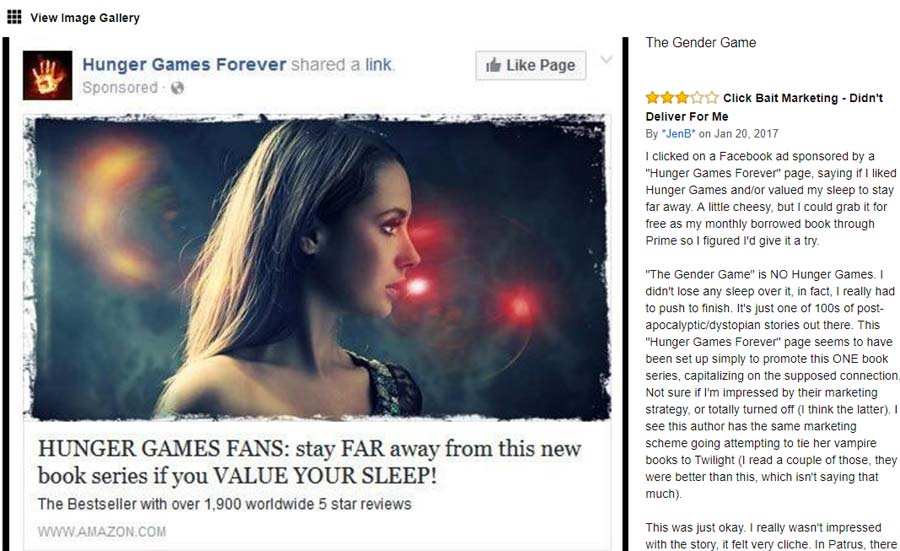
In case you have trouble reading the image, it basically says they came to the Amazon page through a sponsored post in a Facebook Page, Hunger Games Forever.
The book in question is positioned as being for fans of The Hunger Games and Divergant and the like. It was published September 24th, 2016.
From what I can tell, the Facebook Page was created on September 28th, 2016, had a slew of posts on that day, then posted sporadically, with the last one being January 24th, 2017 (the review was posted Jan 20th). At the time of writing the Page has 19,235 likes.
So it seems like this Page was set up specfically for this, which isn't a bad tactic (though a bit shady). If your book is targeted at a specific audience of another famous book, then you can set up a fan page for it, engage the audience, then post your book ("Oh hey, I just found this..."). There's an inherit trust there (hence the shady part), but you're posting to a very specific set of people that are right who you're looking for.
Obviously you won't get everyone - see Caveats below - but you can easily boost the post, as was the case here.
Caveats
As with anything, there are things to keep in mind in terms of the results.
First and foremost is the actual reach you can expect to have when posting to groups like this. This is called your organic reach (as opposed to paid reach).
It's hard to find actual numbers. The best I could come up with was here and here which estimate Page reach at anywhere between 2% and 10%. They're mostly talking about a Page you run, like your author Page, rather than Pages you post on, but you get the idea.
Again, there's no real way aside from being the group admin to see what the actual value is, but you can be sure Facebook isn't showing every post in a group to every person in the group. This post by Facebook from 2014 explains that on any given time, there are about 1,500+ pieces of content vying for any particular user's attention, of which 300 are shown in the News feed. If a user is active in a group, then they can expect to get notifications when someone posts something, but otherwise, they'd need to visit the group, or you need to be lucky.
Similar to this are the sheer number of posts some groups get. Large groups can easily get a flood of continuous content that'll quickly bury your own.
On top of that is the quality of the books being posted. There are exceptions of course, and I don't want to call out any particular author, but there are a lot of low quality/erotic books being posted. That's not to say there isn't an audience for those books, or that there's anything wrong with erotica, but you will be getting judged by proxy.
For the results themselves, on the paid promo, my girlfriend actually reposted one of the links (hence my warning in the setup section!), which, depending on the timezone Amazon reports in, could account for the solitary sale (I know, right?).
For the free promo, again, one of the posts was re-posted in a book group I'm part of, which could also account for anywhere up to 5 clicks.
I also didn't post in every group for both promos. I stayed away from review-only groups, those that disallow URL-shorteners in their rules, and free-only groups for the paid promo.
Some groups also don't allow posts until they've been approved by the admin.
During the free promo, I didn't do any other promotion of the book, but I can't discount any normal purchases from people seeing it in the Amazon charts, in which case the click-to-download ratio is even worse.
But Damian, maybe your promo image/text just sucked.
That's possible. But at least it sucked relatively for both promos. Technically, you could test this out different variations for the paid promo every day, but you'll get much faster results going through Facebook ads and using their in-built A/B testing.
But Damian, maybe your cover sucks.
Also possible, it's something to test.
But Damian, maybe your description sucks.
Again something I'll probably test if I have time.
But Damian, maybe your book sucks.
Okay, okay, I get it! But it's not a bad point actually. Ideally you'd run this test for a variety of genres in order to rule out bias. Which is where you come in.
Lemme at it
If you want to try this yourself, then excellent! Just below this you'll see the support files for this post. It contains two HTML files that will let you:
- Generate the unique param for each Facebook group you're in, as well as the short link you're going to share
- Allow you to write the sales pitch you're going to use, and with the click of a button, replace the URL, copy the text, and open the right Facebook group to post in
All told, posting will only take a few minutes. Then you simply count up the results and if you want, share them with me.
Inside the zip, you'll find a README laying out all the steps you need to take to get started.
Good luck!
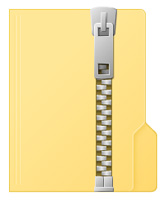
Get all the code necessary to make this work
Download the tools to make posting to Facebook groups a cinch
Download
